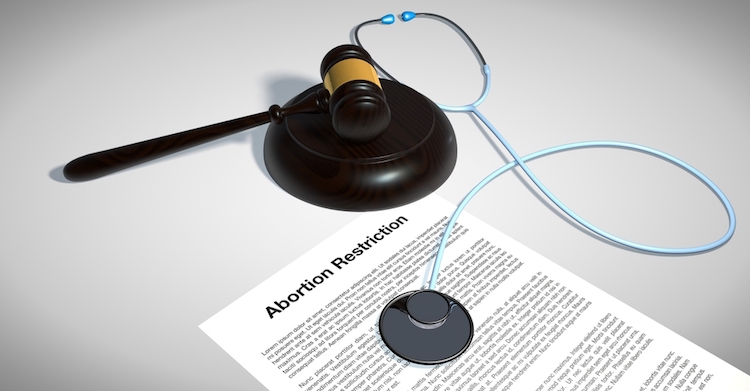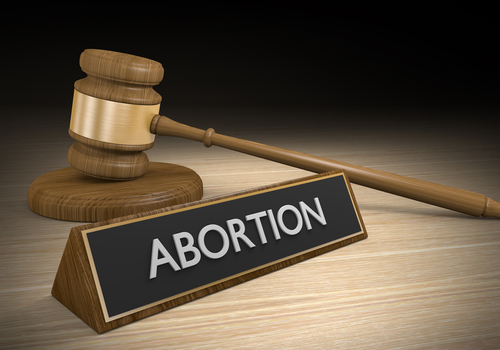Supreme Court allows abortion providers to sue over Texas law but keeps law intact for now

Images from Shutterstock.
The U.S. Supreme Court ruled Friday that abortion providers can sue over a Texas abortion law that authorizes private parties to sue anyone who aids an abortion performed after about six weeks of pregnancy.
The court said abortion providers could sue state officials with authority over medical licenses but not other officials. The majority opinion did not address whether the Texas law is constitutional and allowed the law to remain in effect.
The high court dismissed a separate challenge filed by the U.S. government as “improvidently granted.”
Eight justices agreed that the abortion providers could sue at least some state officials. Justice Clarence Thomas said he did not think that the abortion providers could sue any of the defendants.
Three liberal justices, along with Chief Justice John G. Roberts Jr., said the Texas law was unconstitutional.
The law, known as SB 8, prevents abortions after a fetal heartbeat is detected, typically at about six weeks of pregnancy. The law relies on the general public, rather than the state, for enforcement. It authorizes lawsuits by private parties who may seek $10,000 in damages against anyone who aids an abortion.
Justice Neil M. Gorsuch wrote the opinion for the court, joined in full by Justices Samuel A. Alito Jr., Brett M. Kavanaugh and Amy Coney Barrett.
 Related article from ABAJournal.com: “What is the potential impact of the abortion case before the Supreme Court?”
Related article from ABAJournal.com: “What is the potential impact of the abortion case before the Supreme Court?”
Thomas joined part of Gorsuch’s opinion, while the other members of the court partly concurred in the judgment.
Gorsuch noted that the Supreme Court granted review based on a petition for certiorari before judgment, and the Supreme Court stands in the shoes of the federal appeals court in such cases.
“In this preliminary posture, the ultimate merits question—whether SB 8 is consistent with the federal Constitution—is not before the court,” Gorsuch wrote. “Nor is the wisdom of SB 8 as a matter of public policy.”
Gorsuch said there are several paths still available to challenge the law. Suits can be brought in state court, and those sued can pursue constitutional arguments in their defense.
Gorsuch said 14 state court suits have already been filed, and abortion providers prevailed on some of their claims in a judge’s summary judgment ruling last night.
Roberts concurred in the judgment in part and dissented in part in an opinion joined by Justices Stephen G. Breyer, Sonia Sotomayor and Elena Kagan.
Roberts said he would have allowed suit against additional defendants, including the state attorney general, who also has authority to seek a penalty for physicians who violate the law. Roberts also would have allowed suit against a court clerk who dockets lawsuits.
Roberts said Texas had “employed an array of stratagems designed to shield its unconstitutional law from judicial review.”
“The clear purpose and actual effect of SB 8 has been to nullify this court’s rulings,” he wrote. “If the legislatures of the several states may, at will, annul the judgments of the courts of the United States, and destroy the rights acquired under those judgments, the Constitution itself becomes a solemn mockery,” he said, using the words of an 1809 decision.
“The nature of the federal right infringed does not matter; it is the role of the Supreme Court in our constitutional system that is at stake.”
Sotomayor wrote a separate partial concurrence and dissent, joined by Breyer and Kagan.
She said the Texas law has had a “near total” chilling effect, depriving women of the opportunity to seek abortions in their home state after six weeks of pregnancy.
“The court should have put an end to this madness months ago,” Sotomayor wrote.
The case filed by the abortion providers is Whole Woman’s Health v. Jackson. The case filed by the federal government is United States v. Texas.
Still pending before the court is Dobbs v. Jackson Women’s Health Organization, a challenge to a Missisippi abortion law that bans abortions after 15 weeks of pregnancy.
Hat tip to SCOTUSblog, which had breaking news of the ruling. Other publications with coverage include the New York Times, CNN and the Washington Post.
See also:
ABAJournal.com: “Chemerinsky: Ruling in abortion cases will greatly affect women’s lives but won’t end controversy”
ABAJournal.com: “Supreme Court will hear Texas abortion case on expedited basis but refuses again to block the law”
ABAJournal.com: “ABA urges Supreme Court to rule US can sue to block unconstitutional Texas abortion law”
ABAJournal.com: “SCOTUS formally rejects request to block Texas abortion ban”
ABAJournal.com: “Supreme Court appears ready to uphold ban on abortions after 15 weeks”



